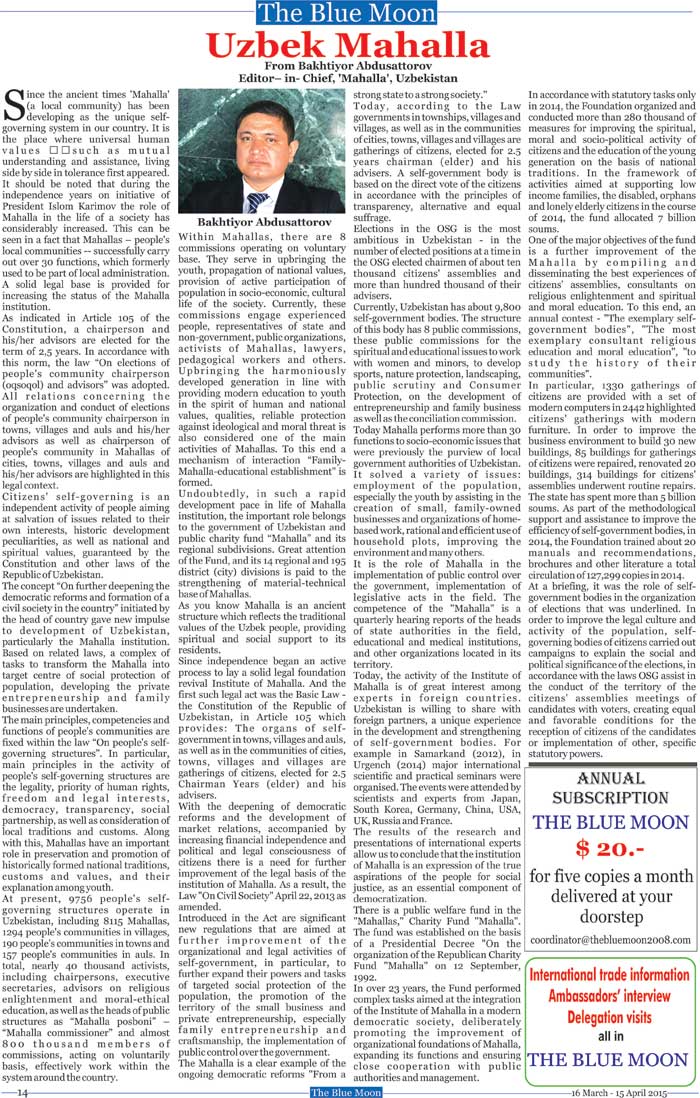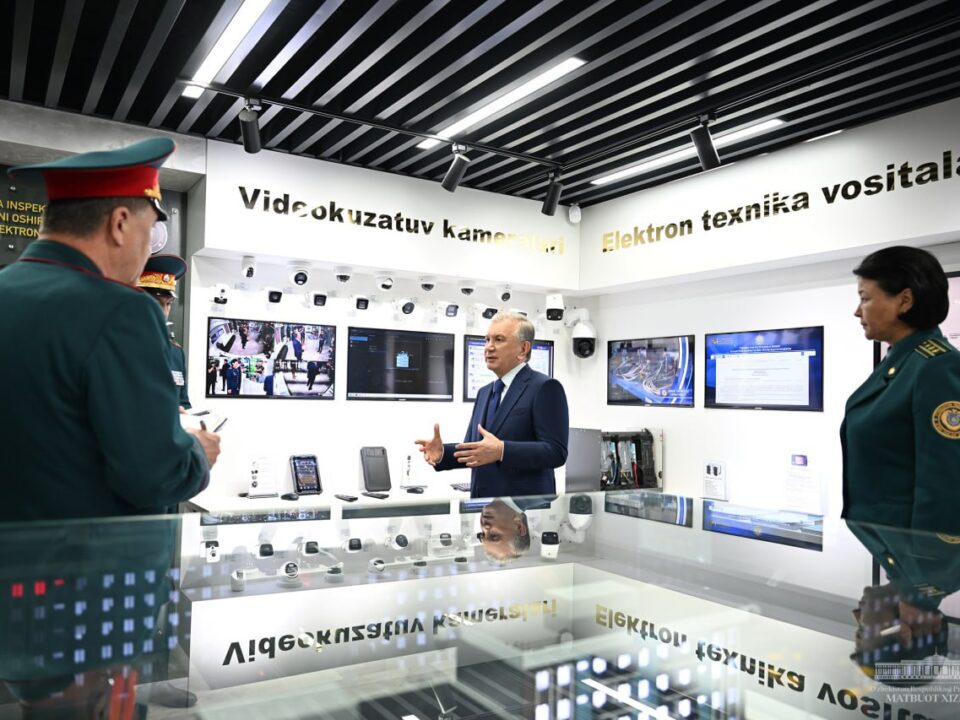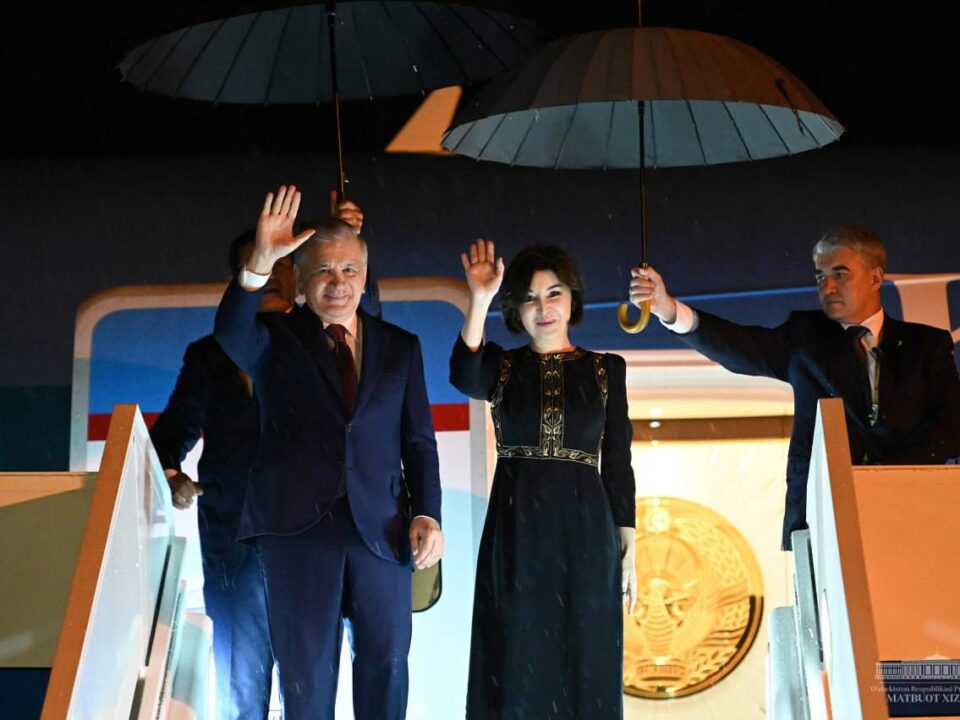By Bakhtiyor Abdusattorov
Editor– in- Chief, ‘Mahalla’, Uzbekistan
Since the ancient times ‘Mahalla’ (a local community) has been developing as the unique self-governing system in our country. It is the place where universal human v a l u e s s u c h a s m u t u a l understanding and assistance, living side by side in tolerance first appeared. It should be noted that during the independence years on initiative of President Islom Karimov the role of Mahalla in the life of a society has considerably increased. This can be seen in a fact that Mahallas – people’s local communities — successfully carry out over 30 functions, which formerly used to be part of local administration. A solid legal base is provided for increasing the status of the Mahalla institution.
As indicated in Article 105 of the Constitution, a chairperson and his/her advisors are elected for the term of 2,5 years. In accordance with this norm, the law “On elections of people’s community chairperson (oqsoqol) and advisors” was adopted. A l l r e l a t i o n s c o n c e r n i n g t h e organization and conduct of elections of people’s community chairperson in towns, villages and auls and his/her advisors as well as chairperson of people’s community in Mahallas of cities, towns, villages and auls and his/her advisors are highlighted in this legal context.
C i t i z e n s ‘ s e l f – g o v e r n i n g i s a n independent activity of people aiming at salvation of issues related to their own interests, historic development peculiarities, as well as national and spiritual values, guaranteed by the Constitution and other laws of the Republic of Uzbekistan.
The concept “On further deepening the democratic reforms and formation of a civil society in the country” initiated by the head of country gave new impulse to development of Uzbekistan, particularly the Mahalla institution. Based on related laws, a complex of tasks to transform the Mahalla into target centre of social protection of population, developing the private e n t r e p r e n e u r s h i p a n d f a m i l y businesses are undertaken.
The main principles, competencies and functions of people’s communities are fixed within the law “On people’s self-governing structures”. In particular, main principles in the activity of people’s self-governing structures are the legality, priority of human rights, f r e e d o m a n d l e g a l i n t e r e s t s , democracy, transparency, social partnership, as well as consideration of local traditions and customs. Along with this, Mahallas have an important role in preservation and promotion of historically formed national traditions, customs and values, and their explanation among youth.
At present, 9756 people’s self-governing structures operate in Uzbekistan, including 8115 Mahallas, 1294 people’s communities in villages, 190 people’s communities in towns and 157 people’s communities in auls. In total, nearly 40 thousand activists, including chairpersons, executive secretaries, advisors on religious enlightenment and moral-ethical education, as well as the heads of public structures as “Mahalla posboni” – “Mahalla commissioner” and almost 8 0 0 t h o u s a n d m e m b e r s o f commissions, acting on voluntarily basis, effectively work within the system around the country.
Within Mahallas, there are 8 commissions operating on voluntary base. They serve in upbringing the youth, propagation of national values, provision of active participation of population in socio-economic, cultural life of the society. Currently, these commissions engage experienced people, representatives of state and non-government, public organizations, activists of Mahallas, lawyers, pedagogical workers and others.
U p b r i n g i n g t h e h a r m o n i o u s l y developed generation in line with providing modern education to youth in the spirit of human and national values, qualities, reliable protection against ideological and moral threat is also considered one of the main activities of Mahallas. To this end a mechanism of interaction “Family-Mahalla-educational establishment” is formed.
Undoubtedly, in such a rapid development pace in life of Mahalla institution, the important role belongs to the government of Uzbekistan and public charity fund “Mahalla” and its regional subdivisions. Great attention of the Fund, and its 14 regional and 195 district (city) divisions is paid to the strengthening of material-technical base of Mahallas.
As you know Mahalla is an ancient structure which reflects the traditional values of the Uzbek people, providing spiritual and social support to its residents. Since independence began an active process to lay a solid legal foundation revival Institute of Mahalla. And the first such legal act was the Basic Law – the Constitution of the Republic of Uzbekistan, in Article 105 which provides: The organs of self -government in towns, villages and auls, as well as in the communities of cities, towns, villages and villages are gatherings of citizens, elected for 2.5 Chairman Years (elder) and his advisers.
With the deepening of democratic reforms and the development of market relations, accompanied by increasing financial independence and political and legal consciousness of citizens there is a need for further improvement of the legal basis of the institution of Mahalla. As a result, the Law “On Civil Society” April 22, 2013 as amended.
Introduced in the Act are significant new regulations that are aimed at f u r t h e r i m p r o v e m e n t o f t h e organizational and legal activities of self-government, in particular, to further expand their powers and tasks of targeted social protection of the population, the promotion of the territory of the small business and private entrepreneurship, especially f a m i l y e n t r e p r e n e u r s h i p a n d craftsmanship, the implementation of public control over the government.
The Mahalla is a clear example of the ongoing democratic reforms “From a strong state to a strong society.”
T o d a y , a c c o r d i n g t o t h e L a w governments in townships, villages and villages, as well as in the communities of cities, towns, villages and villages are gatherings of citizens, elected for 2.5 years chairman (elder) and his advisers. A self-government body is based on the direct vote of the citizens in accordance with the principles of transparency, alternative and equal suffrage.
Elections in the OSG is the most ambitious in Uzbekistan – in the number of elected positions at a time in the OSG elected chairmen of about ten thousand citizens’ assemblies and more than hundred thousand of their advisers.
Currently, Uzbekistan has about 9,800 self-government bodies. The structure of this body has 8 public commissions, these public commissions for the spiritual and educational issues to work with women and minors, to develop sports, nature protection, landscaping, public scrutiny and Consumer Protection, on the development of entrepreneurship and family business as well as the conciliation commission. Today Mahalla performs more than 30 functions to socio-economic issues that were previously the purview of local government authorities of Uzbekistan. It solved a variety of issues: employment of the population, especially the youth by assisting in the creation of small, family-owned businesses and organizations of home- based work, rational and efficient use of household plots, improving the environment and many others.
It is the role of Mahalla in the implementation of public control over the government, implementation of legislative acts in the field. The competence of the “Mahalla” is a quarterly hearing reports of the heads of state authorities in the field, educational and medical institutions, and other organizations located in its territory.
Today, the activity of the Institute of Mahalla is of great interest among e x p e r t s i n f o r e i g n c o u n t r i e s.
Uzbekistan is willing to share with foreign partners, a unique experience in the development and strengthening of self-government bodies. For example in Samarkand (2012), in Urgench (2014) major international scientific and practical seminars were organised. The events were attended by scientists and experts from Japan, South Korea, Germany, China, USA, UK, Russia and France.
The results of the research and presentations of international experts allow us to conclude that the institution of Mahalla is an expression of the true aspirations of the people for social justice, as an essential component of democratization.
There is a public welfare fund in the “Mahallas,” Charity Fund “Mahalla”.
The fund was established on the basis of a Presidential Decree “On the organization of the Republican Charity Fund “Mahalla” on 12 September, 1992.
In over 23 years, the Fund performed complex tasks aimed at the integration of the Institute of Mahalla in a modern democratic society, deliberately promoting the improvement of organizational foundations of Mahalla, expanding its functions and ensuring close cooperation with public authorities and management.
In accordance with statutory tasks only in 2014, the Foundation organized and conducted more than 280 thousand of measures for improving the spiritual, moral and socio-political activity of citizens and the education of the young generation on the basis of national traditions. In the framework of activities aimed at supporting low income families, the disabled, orphans and lonely elderly citizens in the course of 2014, the fund allocated 7 billion soums.
One of the major objectives of the fund is a further improvement of the M a h a l l a b y c o m p i l i n g a n d disseminating the best experiences of citizens’ assemblies, consultants on religious enlightenment and spiritual and moral education. To this end, an annual contest – “The exemplary self-government bodies”, “The most exemplary consultant religious education and moral education”, “to s t u d y t h e h i s t o r y o f t h e i r communities”.
In particular, 1330 gatherings of citizens are provided with a set of modern computers in 2442 highlighted citizens’ gatherings with modern furniture. In order to improve the business environment to build 30 new buildings, 85 buildings for gatherings of citizens were repaired, renovated 20 buildings, 314 buildings for citizens’ assemblies underwent routine repairs. The state has spent more than 5 billion soums. As part of the methodological support and assistance to improve the efficiency of self-government bodies, in 2014, the Foundation trained about 20 manuals and recommendations, brochures and other literature a total circulation of 127,299 copies in 2014.
At a briefing, it was the role of self-government bodies in the organization of elections that was underlined. In order to improve the legal culture and activity of the population, self-governing bodies of citizens carried out campaigns to explain the social and political significance of the elections, in accordance with the laws OSG assist in the conduct of the territory of the citizens’ assemblies meetings of candidates with voters, creating equal and favorable conditions for the reception of citizens of the candidates or implementation of other, specific statutory powers.



























